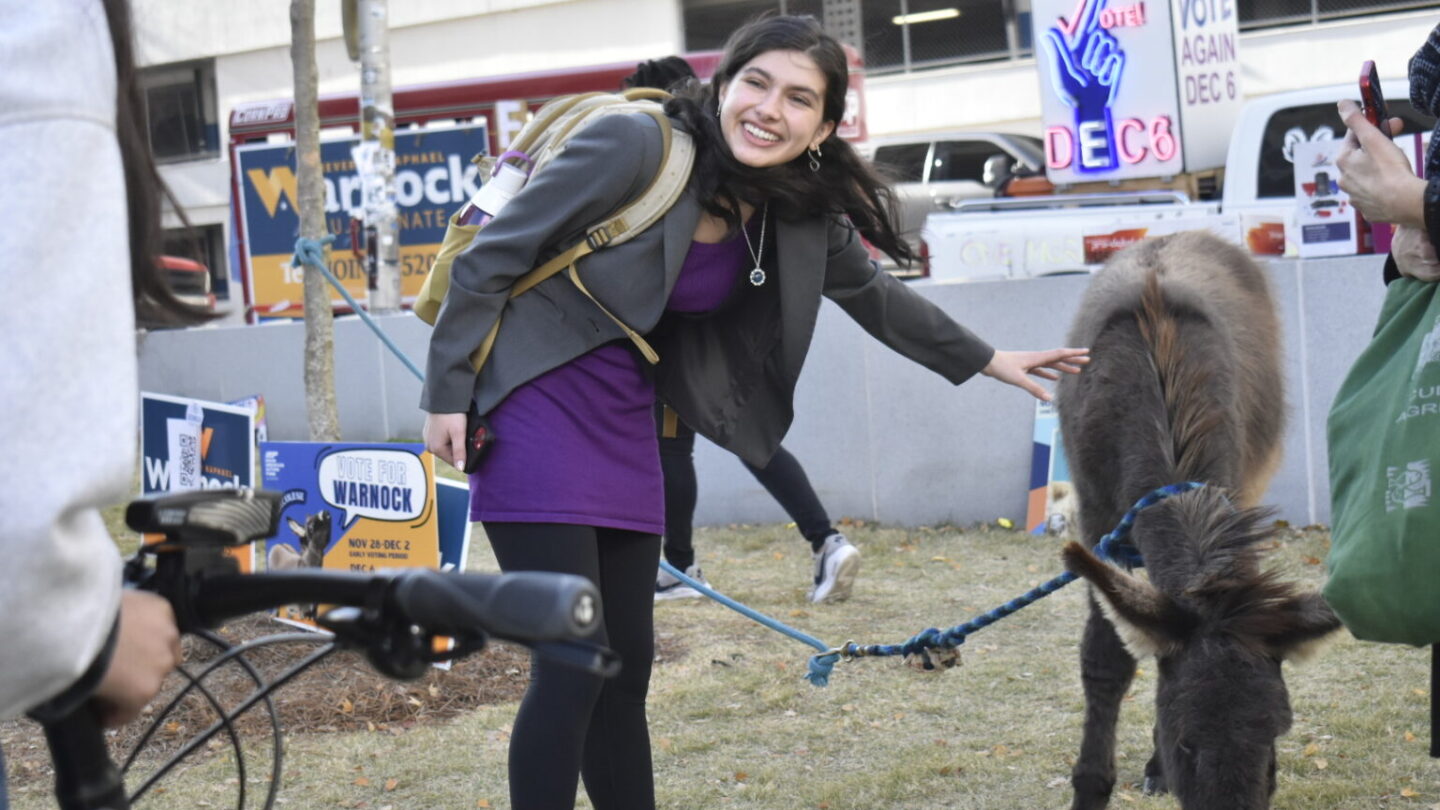Youth must be served: Warnock schooled Walker in winning young voter turnout

U.S. Sen. Raphael Warnock kicked off his runoff campaign in Atlanta last month beneath a mural of his friend and former parishioner, the late Congressman John Lewis with an introduction not by a fellow senator or other powerful surrogate, but by Morehouse student RJ Jackson.
Heading into last week’s runoff, Warnock’s final campaign events of the cycle were joined by Florida Congressman-elect Maxwell Frost, the 25-year-old hailed as the first member of Generation Z elected to Congress.
Warnock’s campaign and the subsequent four-week runoff were characterized by stops at college campuses across the state.
“They’re concerned about student debt, they’re concerned about the existential crisis of climate change,” Warnock told reporters at his alma mater Morehouse College ahead of Election Day. “And they struggle to see themselves in the conversation. And so I spend a lot of time with young people on these campuses, young people in my church, because I think what we need in this moment is the idealism of youth. This idea that the country can be better, that the world can be better.”
The senator’s bid for the youth vote seems to have paid off.
While detailed voter data from the runoff is still being compiled, data from the Nov. 8 general election shows that nationwide, 27% of voters between 18 and 29 cast a ballot in 2022, marking the midterm with the second-highest voter turnout in nearly three decades, according to CIRCLE, the Center for Information & Research on Civic Learning and Engagement at Tufts University.
Georgia’s young voters topped that high mark with 30.4% turnout in November, and young Georgia voters favored Warnock over Republican Herschel Walker by nearly two to one.
“The net difference in votes that Warnock received from young people made up more than the margin of victory of the entire race, which indicates that young people turning out in the numbers they did with the preferences they did had a decisive impact in sending this race to a runoff,” said CIRCLE election coordinator Ruby Belle Booth.
Early voting data suggests that youth turnout remained high for the runoff, especially among the youngest voters, those between 18 and 24.
Warnock’s heavy targeting of Georgia universities is partially to credit for his high performance among youth voters, Booth said.
“Warnock having events that speak directly to young people, that’s the kind of work that a candidate has to do to appeal to young voters. It’s the same as any other constituent, you want to talk to young people, find out what issues matter to them and then make sure that you fight for them when you actually get into office, make those issues central to your campaign.”
Walker was criticized for seeming to dismiss the issues of youth voters in a series of statements. In one interview, he was asked what he would say to young people who want to change the country.
“We’re not showing our kids that most of the people today haven’t earned the right to change America, and what I mean by that is there are people who have died, who have given their life up for this flag, they’ve given their life up for the national anthem, they’ve given their life up for our freedom and the liberties that we have in this country today, and we’re taking that for granted,” he said. “I don’t want that to happen. I’m not being tough, but I’m saying if you know a place better, you go there, but you’ll lose your citizenship here.”
In another, he suggested that young people are not capable of detecting racism:
“Why are you asking an 18-year-old if something is racist? They don’t even know what it is. Go to your grandparents. Go to them and start asking them.” he said.
In the early days of the campaign, it seemed that Walker’s son, conservative commentator Christian Walker, may have been an asset in bringing in younger voters, but Christian Walker’s role in the campaign went from mostly silent to openly hostile as negative stories mounted.
But the candidates themselves cannot take all the credit or the blame. An army of youth organizers spent the four weeks leading up to the runoff getting out the vote. Among them was Alex Ames, Georgia Tech student and founder of the Georgia Youth Justice Coalition.
The coalition and its partners targeted state colleges and HBCUs with more than 300 young canvassers. Together, they reached out to more than 150,000 young voters.
A big part of their job was explaining how, when and where to vote in the abbreviated runoff under the state’s new election law, Ames said.
“These are all kids who go to those schools that aren’t necessarily activist types, they’re just kids who understood this election was a big deal and it is hard to vote,” she said. “This is an entirely new election law. So even if you’re like me and voted for the first time in 2020 so this is your second time having a big runoff, it’s an entirely different runoff with entirely different laws. Particularly things like vote by mail and early voting, which are particularly important if you’re a college student and a worker who can’t necessarily take time off to get to the polls on Election Day.”
CIRCLE data shows that young people have been increasing their civic participation beyond the ballot box.
“I think that this is a shift that’s happening in young people seeing their power within a political system,” Booth said. “It’s no surprise that it started in 2018, for the most part alongside the March for our Lives movement and the young people who were getting politically engaged after the Parkland shooting. I think that offered an example of how you can connect the issues you face in your community as a young person to politics and to elections.”








